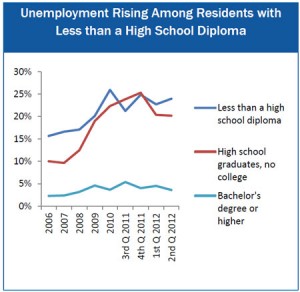Recessions usually pack the biggest punch to low-skill workers, and the most recent downturn ‘ the “Great Recession” ‘ certainly tells that story. Across the nation, the number of jobs for college-educated workers actually rose over the past five years, according to a recent national study, while jobs for workers without a college degree fell sharply and still have not come back completely.
That sounds a lot like what is happening in DC. Behind the good news of falling unemployment in the city ‘ the latest unemployment rate of 8.9 percent is well below the recession peak of 10.5 percent from a year ago ‘ the return to work has been much smoother for residents with higher education than those with a high school degree or less schooling.
This confirms the urgent need, in DC and the nation as a whole, for employment efforts targeted toward residents without advanced degrees.
According to the national study, The College Advantage, the number of jobs for non-college educated workers is 10 percent lower today than in 2007. For workers with some post-secondary education but not a full college degree, the number of jobs fell during the recession but has almost recovered fully. Meanwhile, jobs for college-educated workers didn’t dip in the recession and are more plentiful today than in 2007.
In DC, more than 20 percent of high school graduates who are looking for work cannot find a job. The unemployment rate for these workers has fallen in the last six months but still is double the rate of 2007. Nearly one-fourth of DC adults without a high school degree are unemployed, and the unemployment rate has not seen any steady improvement since 2008. For college-educated DC residents, by contrast, just 3.6 percent are unemployed, which is about the same as their unemployment level in 2008.
The disappointing employment recovery for DC residents without a college degree follows a long-term decline in the job prospects for this group of residents, through periods of economic growth and decline. The employment rate for DC adults with a high school diploma or GED fell from 67 percent in 1988 to 58 percent in 2000 and 48 percent in 2009, according to a DCFPI report.
Improving educational outcomes in the District is critical in the long-term to addressing our unemployment problems. But a key part of the solution also has to include helping workers compete in our job market without a college degree. That is why it is important for the city to keep making progress on welfare-to-work reforms, improving connections between job training providers and employers, and taking greater advantage of federal funds for training. DCFPI will be writing more about these important initiatives this fall.
